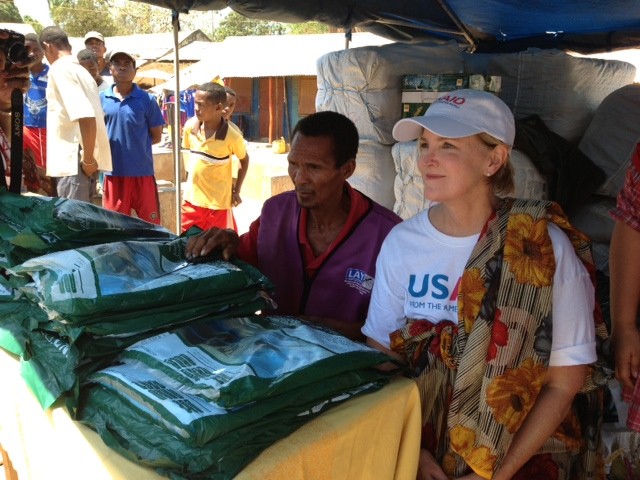
For Immediate Release
Mahajanga, Madagascar –Mission Director Susan Sawhill Riley attended on September 30 in Mahajanga the launch of a mass distribution campaign for close to 3,000,000 mosquito nets to fight malaria across northwestern Madagascar. This campaign, conducted by USAID and its partners, including PSI/Madagascar, UNICEF and the Global Fund, impressive logistic and staff.
Addressing the people of Betsako in Mahajanga-II district, Mission Director Riley said, “You can avoid getting ill and heal from malaria. I invite you to go to the distribution sites and get the free bed nets for your family. Then, you have to hang it above your bed and sleep under it every night, every day without exception, from Monday to Sunday and from January through December. That is the message you have to take home and put in practice every day.”
According to the National Malaria Control Plan for 2013-2017, malaria is the cause of more than Ariary 110 billion ($52 million) of economic losses for Madagascar. Each dollar used in malaria control in Africa provides 40 times as much return on investment.
The campaign figures are awe-inspiring: over 6.6 million people and 1.3 million households will receive bed nets; 2.7 million bed nets will be distributed, worth over all Ariary 22 billion ($10 million). Ten NGOs will work together in 1,300 sites with more than 7,218 community workers to facilitate the distribution. The bed nets will be carried by trucks, bull carts, canoes and even on men’s back to ensure that they are available in all villages, even the remotest ones.
After more than 2.1 million treated bed nets were distributed in the east coast in 2012, the campaign will now focus on the six endemic regions in the west, including Sofia, Menabe, Boeny, Ihorombe, Bongolava, and Melaky.Community workers will not only distribute bed nets. They will visit each household and make sure that the bed nets are correctly used.
The President’s Malaria Initiative (PMI) led by USAID and implemented in collaboration with the Center for Disease Control and Prevention (CDC) works in 19 African countries and in the Great Mekong sub-region. The Initiative started in December 2005 with a goal to halve the burden of malaria for 70 percent of at-risk populations in Sub-Saharan Africa by 2014. PMI supports four major activities in Madagascar, including bed net promotion and distribution, indoor residual spraying, intermittent preventive treatment in pregnant women, and correct treatment with effective drugs.
The success of malaria control is one of the most impressive development stories. For the last decade, malaria cases have been reduced by half in more than forty countries thanks to global efforts. Within ten years, the malaria prevalence rate in Madagascar decreased from 9 percent in 2000 to less than one percent in 2010.
The United States has supported the development of the Malagasy people for the last 27 years, especially in public health. This year, USAID is providing over $66 million in assistance to the Malagasy people with programs that include investments in health, food security, and water and sanitation programs.







Comment
Make a general inquiry or suggest an improvement.